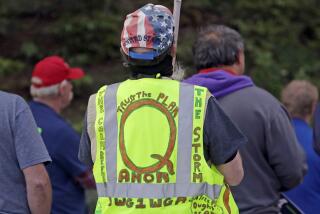Savage Words, Deadly Deeds : The Allure of Malignant Ideas
STANFORD — “Words ought to be a little wild,” the eminent British economist John Maynard Keynes wrote in 1933, “for they are the assault of thoughts on the unthinking.” Were he alive to witness this country’s rhetorical wars today, Keynes might have to swallow those very words. The wildness of our contemporary political dialogue has swollen beyond anything he might have imagined, even in the contentious atmosphere of Depression-era Britain in which he wrote.
Many pundits, commentators and self-anointed political savants do not merely mount polemical assaults aimed at jarring the unthinking into sentience; they wage a savage, all-out blitzkrieg against thinking and unthinking alike--a merciless verbal carpet-bombing in which fantastic hyperbole and berserk conspiracy theories are the standard ordnance. Among the victims is responsible thought itself. What we need now, Keynes might advise, is less wildness and more sobriety.
Like healthy human tissue that goes cancerous, so can ideas--good ones as well as bad--metamorphose, under certain conditions, into grotesque and deadly toxins. U.S. history overflows with examples of our propensity to inflate a sound idea into an overblown, sometimes whacked-out and dan- gerous caricature of its original self.
This reflexive extremism may be a tendency deeply rooted in the national character; some historians have come tantalizingly close to concluding that the American Revolution itself grew out of exaggerated, nearly paranoiac anxiety about a British “conspiracy” against American liberties that had only the scantiest basis in fact. Perhaps we were marked from birth as a nation with a temperamental disposition toward ideological excess. That temperament may have made us eternally hyper-vigilant to protect our liberties--but it has also, at times, made us suckers for the rankest kinds of intellectual hucksterism and political exploitation.
In more recent times, Sen. Joseph R. McCarthy provided a stunning demonstration of how to take a legitimate national concern--containing the power of communism in the immediate post-World War II years--and inflate it by heedless accusation, gross distortion and baseless insinuation into a destructive national obsession. To their credit, the American people ultimately saw through McCarthy, and brought him down.
But though he was exposed as a reckless charlatan and provocateur , McCarthy left a malignant legacy. Before his demise, he managed to spawn a fear-driven and fear-spreading progeny, a “radical right” that has included the John Birch Society as well as the gun-toting “militias” that today claim to be manning the ramparts of the republic against the menacing blue-helmeted hordes of the United Nations.
Nor has the left shown any immunity from this affliction. Starting with the sound idea, now endorsed, retrospectively, even by Robert S. McNamara, that the U.S. government made a terrible mistake in waging the war in Vietnam, many on the left transformed the attack on the government’s war policy into an attack on government itself--indeed, into an attack on a whole array of institutions, including universities, improbably accused of being in cahoots with a vast and loathsome conspiracy entitled “U.S. imperialism.”
This was ideological escalation of the most uninhibited sort--unfettered, even unhinged, in its febrile and phantasmic theorizing. It led directly to violent eruptions like the Weather Underground’s “Days of Rage” in Chicago, in 1969, and to the bombing of the University of Wisconsin’s Army Mathematics Research Center, in August, 1970, that killed a student worker who, as it happened, was an opponent of the war.
To put it mildly, those maniacal acts gave the anti-war cause a bad name, and arguably slowed, rather than speeded, the crystallization of a national consensus demanding U.S. withdrawal from Vietnam. And like McCarthy on the right, the overheated atmosphere of the left in the 1960s nurtured a noxious residue--including the attitude that McNamara, in his recent confessional book, correctly laments as “the cynicism and even contempt with which so many people view our political institutions and leaders.”
That attitude may have begun as healthy criticism of a mistaken policy; but fed by the moral posturing and brainless sloganeering of the ‘60s left, it metastasized into a lethal social poison--one that spread through much of society and seems to have infected the right with special virulence. Democracy, which Abraham Lincoln defined as government of, by and for the people, cannot easily survive in an atmosphere of cynical and contemptuous regard for government itself.
Just as the murderous antics of the Weather Underground cost the anti-war movement in the ‘60s and ‘70s credibility and support, the Oklahoma City bombing may discredit, or at least dampen, the anti-government campaign of today.
Many Americans share a sense that our government needs some fundamental rethinking and restructuring. But our national discussion of that supremely important topic has not been well-served by the bombast and ranting that too often pass for thought and that seem capable of exciting in some breasts the frightful passions that apparently inspired the explosion on April 19.
At a minimum, the shock of Oklahoma City may define a limit to the wholesale attacks on government that have been so irresponsibly merchandised throughout the airwaves and newsstands of the land for the last generation. It’s time, as Adlai E. Stevenson once said, to talk sense to the American people. It’s time, as Keynes also remarked, to recognize, “It is ideas, not vested interests, which are dangerous for good or evil.” It’s time for some good ideas, carefully crafted and responsibly argued. It’s time, in American English, to shut up and start thinking.
More to Read
Get the L.A. Times Politics newsletter
Deeply reported insights into legislation, politics and policy from Sacramento, Washington and beyond. In your inbox three times per week.
You may occasionally receive promotional content from the Los Angeles Times.










